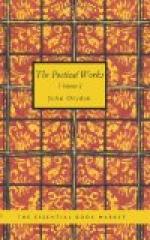With Socrates may see their Maker’s face, 210
While thousand rubric-martyrs want a place.
Nor does it balk my charity to find
The Egyptian bishop[88] of another mind:
For though his creed eternal truth contains,
’Tis hard for man to doom to endless pains
All who believed not all his zeal required;
Unless he first could prove he was inspired.
Then let us either think he meant to say
This faith, where publish’d, was the only way;
Or else conclude that, Arius to confute, 220
The good old man, too eager in dispute,
Flew high; and as his Christian fury rose,
Damn’d all for heretics who durst oppose.
Thus far my charity this path has
tried,
(A much unskilful, but well meaning guide:)
Yet what they are, even these crude thoughts
were bred
By reading that which better thou hast
read,
Thy matchless author’s work:
which thou, my friend,
By well translating better dost commend;
Those youthful hours which, of thy equals
most 230
In toys have squander’d, or in vice
have lost,
Those hours hast thou to nobler use employ’d;
And the severe delights of truth enjoy’d.
Witness this weighty book, in which appears
The crabbed toil of many thoughtful years,
Spent by thy author, in the sifting care
Of Rabbins’ old sophisticated ware
From gold divine; which he who well can
sort
May afterwards make algebra a sport:
A treasure, which if country curates buy,
240
They Junius and Tremellius[89] may defy;
Save pains in various readings, and translations;
And without Hebrew make most learn’d
quotations.
A work so full with various learning fraught,
So nicely ponder’d, yet so strongly
wrought,
As nature’s height and art’s
last hand required:
As much as man could compass, uninspired.
Where we may see what errors have been
made
Both in the copiers’ and translators’
trade;
How Jewish, Popish interests have prevail’d,
250
And where infallibility has fail’d.
For some, who have his secret meaning
guess’d,
Have found our author not too much a priest:
For fashion-sake he seems to have recourse
To Pope, and Councils, and Tradition’s
force:
But he that old traditions could subdue,
Could not but find the weakness of the
new:
If Scripture, though derived from heavenly
birth,
Has been but carelessly preserved on earth;
If God’s own people, who of God
before 260
Knew what we know, and had been promised
more,
In fuller terms, of Heaven’s assisting
care,
And who did neither time nor study spare,
To keep this Book untainted, unperplex’d,
Let in gross errors to corrupt the text,
Omitted paragraphs, embroil’d the




